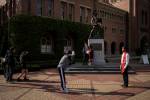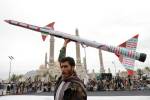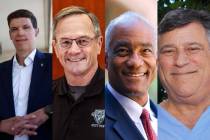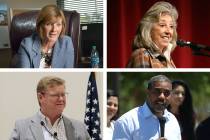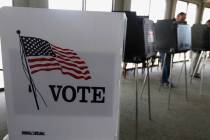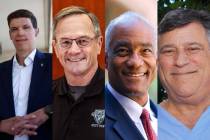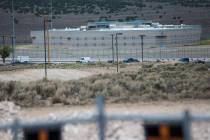Reid was Nevada’s go-to lawmaker for gaming, tourism and transportation
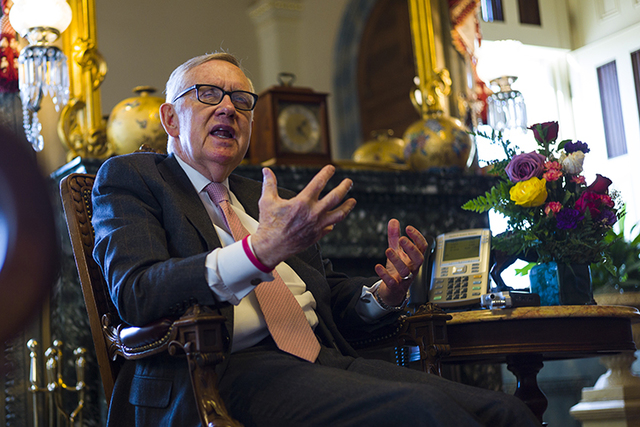
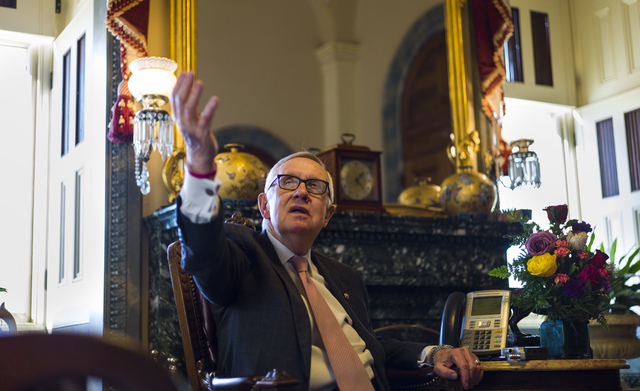
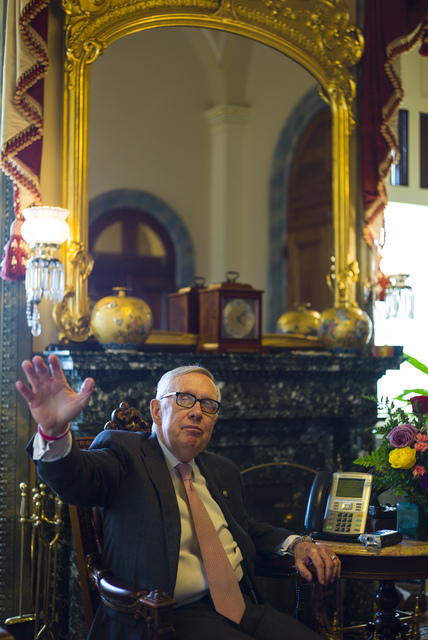
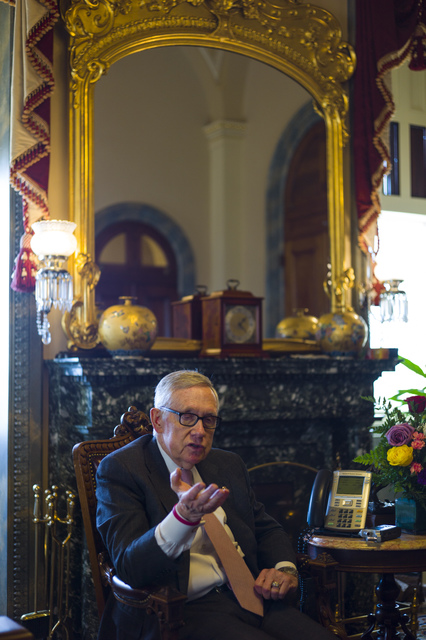
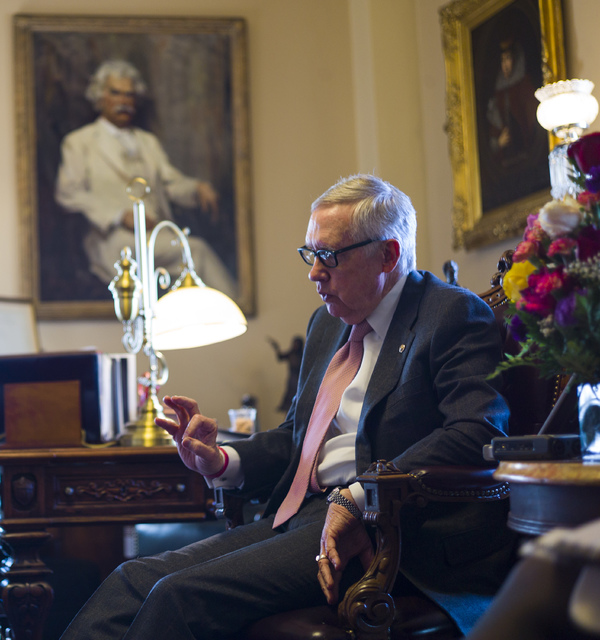
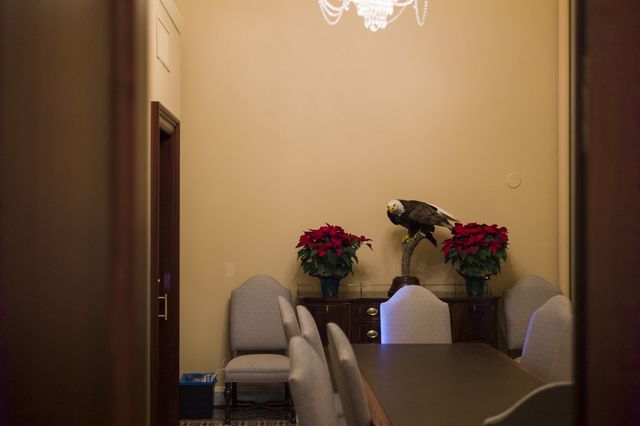
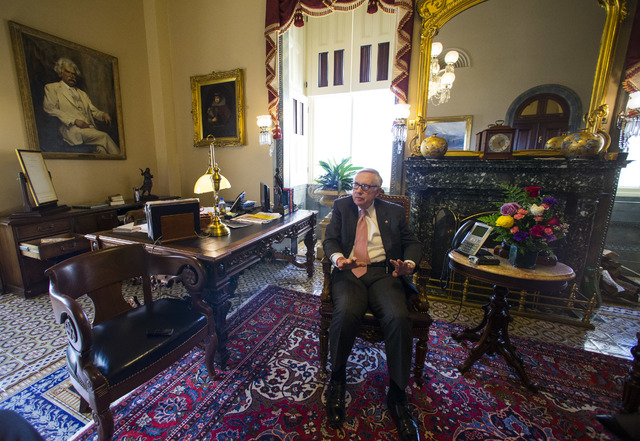
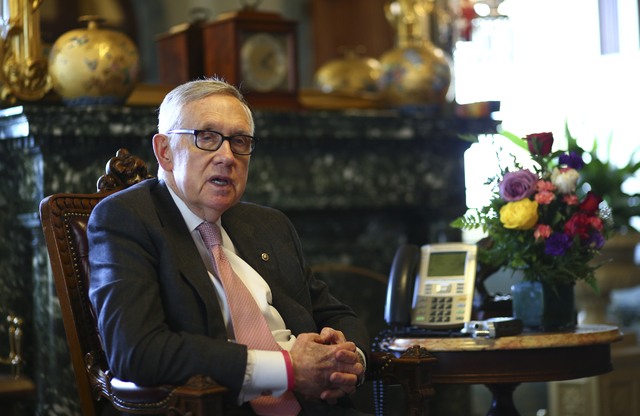
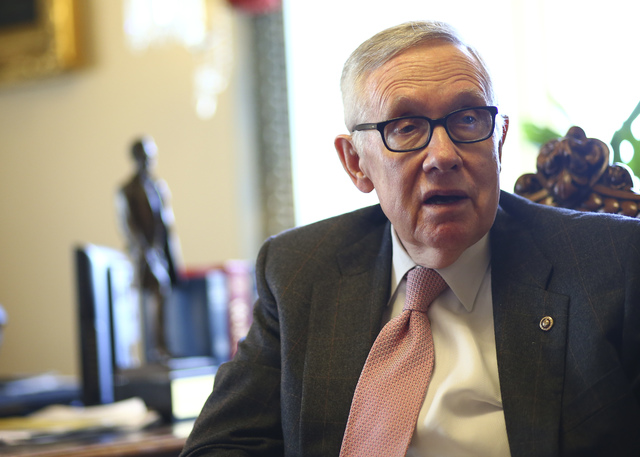
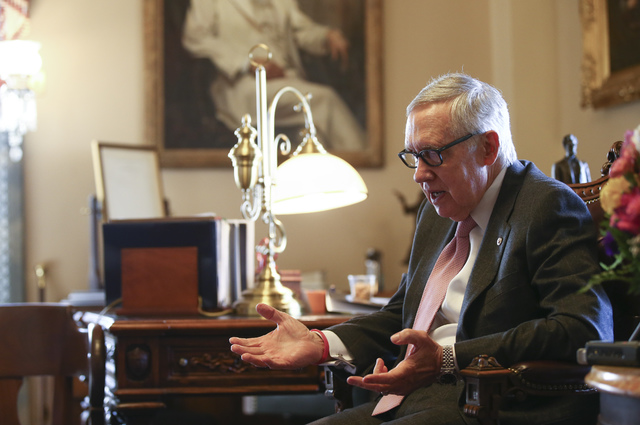
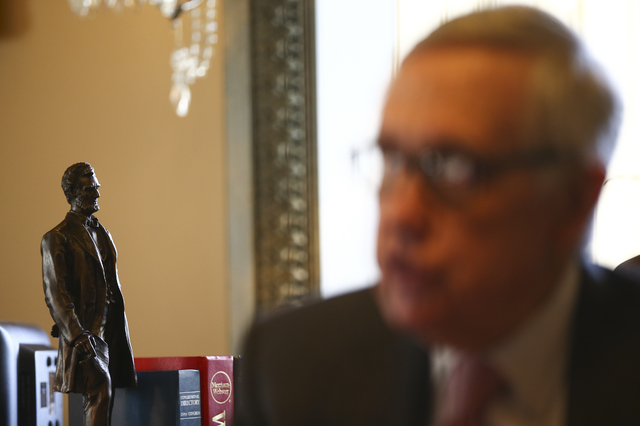
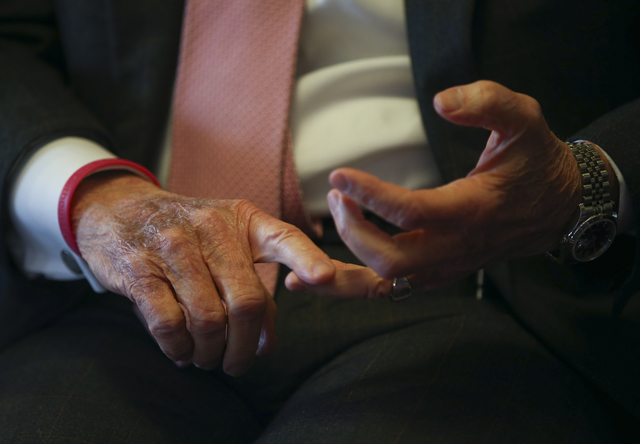
It was a Friday afternoon in March 2009 when Sen. Harry Reid may have made his most significant contribution to Southern Nevada’s gaming industry and tourism economy.
He didn’t cast a vote or make a speech. He just made a few phone calls.
MGM Resorts International — then known as MGM Mirage — was on the verge of shutting down construction of its $9.1 billion CityCenter project on the Strip. News helicopters were hovering overhead capturing images of trucks delivering rented fencing to seal off the construction site.
In public appearances after that day, Chairman and CEO Jim Murren said it was MGM’s darkest hour. Had CityCenter shut down, hundreds of construction workers would have become immediately unemployed. CityCenter — a symbol of hope at a time when Southern Nevada’s tourism economy had been crushed by the growing Great Recession — could have been permanently shuttered and the company could have been plunged into bankruptcy.
Murren, acting on an offer Reid had made, called the Nevada senator after MGM’s joint-venture partner, Dubai World, filed a suit accusing their partner of financial mismanagement. MGM said the charges were baseless, but a $200 million payment to the general contractor hung in the balance and MGM’s bankers were reluctant to relax their lending terms.
Murren went to Reid, who went to executives in the banking industry. Hours before the word was to be given to shut everything down, banking executives finally returned Murren’s calls, saying that their boss’s boss’s boss had told them to do so.
Terms were adjusted. The project continued on. Weeks later, Dubai World and MGM resolved their differences and the end result was CityCenter opening as planned eight months later.
That was one example of how Reid’s long association with the gaming industry paid off to Nevada’s benefit. But not every phone call ends with such dramatic results. Reid has made calls on the 68-story Fontainebleau eyesore and on behalf of Caesars Entertainment Corp., mired in a long bankruptcy proceeding, but has little to show for it.
Still, Reid’s work over the years has helped turn gaming from a vice-driven desert oddity into a burgeoning $240 billion industry with a presence in all but two states.
Tom Skancke, former CEO of the Las Vegas Global Economic Alliance, said the 77-year-old Reid, who is retiring after a three-decade political career that saw him rise higher than any Nevada politician before him, has always been the go-to lawmaker on all things related to gaming, tourism and transportation.
“His departure from the Senate and not having that level of experience is going to have a dramatic impact on the future of our state,” he said. “He knew the rules and he knew the process. He knew where programs were funded and where to go.”
QUICK EDUCATION
Reid helped the gaming industry go mainstream by explaining it to legislative leaders from all over the country.
He received his own education in the industry as lieutenant governor to Gov. Mike O’Callaghan in the early 1970s. It was O’Callaghan, one of Reid’s high-school teachers and mentors, who appointed Reid chairman of the Nevada Gaming Commission in 1977.
It’s a period that’s widely regarded as a time that forever changed the gaming industry, when regulators rooted out — and booted out — mob figures that ran Las Vegas casinos. And Reid was right in the middle of it.
“I had a real quick education in gambling,” Reid said in an interview in his Senate Minority Leader’s office in the Capitol. “When I became chairman, there was no legal gambling anywhere else in the country and I quickly learned that Nevada casinos were run by mobs based in other cities.”
While law enforcement officers were wiretapping suspected criminals operating in Nevada casinos, Reid was setting up appointments for O’Callaghan with eccentric millionaire Howard Hughes in a bid to have more corporations running hotels and casinos.
“When the wiretaps came out, I was stunned,” Reid said.
Reid and his fellow commissioners levied some of the steepest fines the industry had ever seen. They closed down properties that were infested with mob figures.
Reid was accused of taking a $12,000 bribe from Jack Gordon, the eventual agent and husband of LaToya Jackson, to win approval for some new casino games. When the FBI moved in to arrest Gordon in a sting, Reid lost his temper and tried to choke Gordon before agents intervened.
CAR BOMB
That wasn’t even the scariest confrontation Reid had as Gaming Commission chairman.
Somebody planted a crude bomb in his family car. Reid produced a chilling account of the incident in an autobiography published and co-written by Mark Warren in 2008, called “The Good Fight.”
“She (Reid’s wife, Landra) turned off the engine and lifted the hood. A wire had been wound from the spark plug and then trailed off to somewhere out of sight. Then she opened the gas tank. The same wire. She ran straight into the house and called me. Don’t start your car!
“The police were sent to gather our children and escort them home safely, and the bomb squad arrived to examine the station wagon,” Reid said. “Apparently, the gas tank hadn’t detonated because the tip of the spark plug had broken off, but it didn’t matter. I came home that night to a family that had been living in terror for years, and it seemed now like it might be a permanent condition.”
The perpetrator was never caught.
FANTASY SPORTS
When Reid talks about the gaming industry today and where it’s headed, he tends to speak more about falling short and what he wishes he could have accomplished.
“I’m terribly concerned about gambling,” Reid said. “This fantasy sports stuff going on is uncontrollable. I’m sure there have been so many people cheated in that. So I opposed that.”
In addition to combating illegal gambling, the American Gaming Association is working to legalize sports wagering nationwide. How daily fantasy sports falls in that category is an open question because different states have different viewpoints of whether fantasy games offered by FanDuel and DraftKings are games of skill or games of chance. Nevada views it as chance — gambling — requiring licensure by state regulators.
Reid educated himself about fantasy sports by listening to audiobooks while he was recuperating from injuries he suffered in an accident he had while using an exercise machine nearly two years ago. He offered a vintage Reid opinion once he had absorbed the issue: “(Daily) fantasy sports is the worst of the worst.”
It falls right into Nevada’s view of daily fantasy.
“I didn’t like them then, I like them even less now,” Reid said. “I know people have fun playing, good luck to them. But it should be controlled and there should be some enforcement. But there’s none, zero.”
It’s an issue Reid will have to hand off to successors — if it even reaches the level of federal scrutiny.
TRANSPORTATION EARMARKS
Another area in which Reid believes he has benefited Nevadans most is closely related to the state’s gaming and tourism economy — transportation.
He admits that his best work resulted from congressionally directed spending — earmarks.
“I am a big fan of congressional earmarks, congressionally directed spending,” Reid said. “I was one of the best at getting money for projects at home.”
Over his time in federal office, Reid has been responsible for directing hundreds of millions of federal dollars to Nevada projects.
The Spaghetti Bowl. Interstate 11. Reno’s McCarran Boulevard. The roadway system around Lake Tahoe. Project Neon. And one of his favorites, U.S. Highway 95 between Railroad Pass and Searchlight, his hometown.
“It was the most dangerous road in Nevada,” Reid said. “Now, it’s a safe four-lane highway.”
Reid’s fingerprints also are on an improvement project for the interchange of Interstate 15 and Interstate 40 in Barstow, California. While the project wasn’t within Nevada’s borders, it was critical for the state “because the focus has always been on getting more traffic to Las Vegas.”
Tina Quigley, general manager of the Regional Transportation Commission of Southern Nevada, said that in her 11 years with the agency, there were dozens of projects that never would have been funded had it not been for Reid.
“It’s very challenging to get federal attention to projects, especially transit and transportation, in the West,” she said. “He was pretty much responsible for getting all the grants we received for the Bonneville, Westcliff and Centennial Hills transit centers.”
HIGH-SPEED FAIL
Reid has always been an advocate for developing high-speed transportation between Las Vegas and its top tourism market, Southern California. But in all his time in Washington, he’s never been able to use his political muscle to get high-speed rail on track. In fact, he opened himself up to more public criticism and maybe made a few political enemies in 2010 by switching from a plan to develop magnetic levitation transportation to traditional high-speed rail.
Reid complained that maglev had three decades to prove itself and that it was time to move on to the more conventional high-speed rail advocated by friends at DesertXpress, now XpressWest.
“I have no ill will toward the people behind the maglev project and want it to be clear that no one, including me, is stopping them from moving ahead with their project,” Reid said at the time.
“While Nevadans are rightfully impressed with the maglev technology, they, like me, just want to see something get done. DesertXpress is ready to break ground and put Nevadans back to work this year.”
Of course, DesertXpress didn’t get anywhere then, either.
Longtime maglev transportation consultant Kevin Coates said it took time, but maglev technology is now being embraced in China because maintenance costs for the system are far less expensive than traditional high-speed rail.
“You can’t blame Harry Reid for this because he’s just one guy,” Coates said. “It’s a conspiracy of ignorance. But Reid didn’t do the country any favors by putting his weight behind Sig Rogich and his buddies.”
He was referring to Rogich and Anthony Marnell, whose company has struggled to put the last financial pieces in place to build the $8 billion XpressWest line.
When Reid yanked the funding away from maglev, it was redirected to the McCarran International Airport connector project. Today it’s a construction zone with a massive flyover bridge under construction.
Quigley pointed out that even though maglev backers lost out, Reid made sure the funding went to a Nevada project.
“It could have easily gone straight into a general fund pot or to other communities,” Quigley said. “Our work will be cut out for us when he leaves.”
RENEWABLE ENERGY
In the last few years of Reid’s time in office, he was able to help grow an industry that should benefit Nevada well into the future — renewable energy.
“That has been so interesting to me,” Reid said. “What got me started was that I read the paper one day and it said they (Nevada Power, predecessor to NV Energy) were going to put in three or four new coal-fired generating facilities in Nevada. Coal-fired, OK?
“I’ve never been a big fan of coal anyway with climate change and billowing all this ugly smoke. I called my staff and said, ‘I’m going to stop that,’ and they said, ‘You can’t do that, you’re up for re-election and they’re (lobbyists for power companies) very powerful,’ and they were right.”
Reid said that for months, people would leaflet cars at churches “and talked about how bad I was.”
“But I called some of them — most of those places were owned by hedge funds and equity firms — and I called whoever they were and I said, ‘You go ahead and do this, but you’re going to pay big time because I’m going to do everything I can to try to mess with your businesses.’ And they quit, every one of them, quit, withdrew. So my threats worked. But I was serious about that.”
Since then, Reid has become an energy and environmental champion, leading the fight for legislation for tax credits for solar, wind and geothermal projects. Last year, legislation was passed to renew credits for another seven years and so far, 200,000 new jobs, many in Nevada, have been created as a result of the growing industry.
THE SENATE VOID
Reid’s retirement is bound to leave a void in the Senate.
In September, The Washington Post reported that the gaming industry was already scouting for potential leadership for the casino cause.
“We’ve had a gift in Harry Reid,” Jan Jones Blackhurst, executive vice president of government relations at Caesars Entertainment, told the Post.
“Now we need to learn to be smart and fast on our own. All of us are acutely aware that the strong voice we always had representing the industry in Washington will be diminished.”
Contact Richard N. Velotta at rvelotta@reviewjournal.com or 702-477-3893. Follow @RickVelotta on Twitter.




